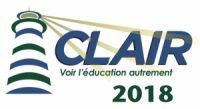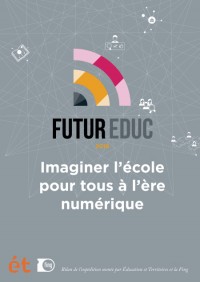Via Mathemagenic (encore une autre fois), tout un document en .pdf : « Weblogs – can they accelerate expertise ?« . Quelle lecture à ce moment-ci de mon cheminement ! Voici la table des matières de ce qui me semble un travail de maîtrise de Guy Dickinson :
« INTRODUCTION…………………………………………………………………3
WEBLOGS – A DEFINITION…………………………………………………….3
WHAT MAKES A WEBLOG?…………………………………………………….4
EXAMINATION OF WEBLOGS FROM AN EDUCATIONAL PERSPECTIVE…6
Research………………………………………………………………………….6
Taxonomies………………………………………………………………………7
Developing domain knowledge……………………………………………….8
Recognising relationships within disparate data…………………………..9
Collaborative learning…………………………………………………………10
EXAMINING EXPERTISE (can weblogs can accelerate expertise?)……11
DEFINING EXPERTISE…………………………………………………………11
LEARNING EXPERTISE………………………………………………………..13
Self-directed learning…………………………………………………………13
Community based learning…………………………………………………..16
ASSESSMENT…………………………………………………………………..17
CONCLUSION…………………………………………………………………..19
REFERENCES…………………………………………………………………..21 »
La beauté de ce document n’est pas tellement de nous révéler plein de choses nouvelles à propos des cybercarnets et de leur potentiel pour favoriser les apprentissages. Par contre, cette dissertation nomme, explique, justifie et cadre ce que nous intuitionnons, actuellement. Voici, en rafale, quelques extraits sur des sujets abondemment traités dans ce carnet :
À propos de la fonction « outil pour la recherche »
« With their emphasis on recording and annotating urls, weblogs, it has been argued, can act as a significant enhancement to the learner’s research process:
³Šthey (weblogs) work wonderfully as personal post-it note systems, since most weblog tools have bookmarklets that let you grab a url and annotate it as you go. They are useful if you work in a distributed environment (in whatever form) and it is useful for students to be able to write about their work and to have that writing accessible in different places in different contexts. » (Miles A, 2002) »
À propos de la fonction « développer un domaine de la connaissance »
« As the learner develops further expertise, aggregating knowledge relevant to their chosen discipline will enhance their educational development. A technology utilised by weblog software, Rich Site Summary (RSS), enables weblogs to display up-to-date, embedded content from other weblogs and web sites. This subject relevant information, if carefully selected, can create a useful flow of information relevant to the learner. Using this type of ancillary information will, however, require the teacher (and learner) to be aware of the dangers that broad but superficial knowledge presents and that personal research is not substituted by this automated tool. »
À propos de la fonction « favoriser des apprentissages collaboratifs »
« Encouraging self and peer assessment is a critical part of any learning environment (Gagne R, 1988, Hollingworth R, McLoughlin C, 2001, Yang H, 2001). While this requires the teacher to develop a culture of non-punitive assessment from peers and the individual learner, the logistics of this additional learning process are significantly simplified when work is presented through a weblog. The Œadd a comment’ feature of weblog entries enables the author and peers within a learning community to develop annotated, indexed material with the inclusion of commentary and reflection. These comments offer the opportunity for reflective thought and the update of original entries from the learner themselves, as well as their peers and teacher. The commentary and assessment is kept as part of the original weblog entry, maintaining context. »
À propos de la fonction « favoriser un processus autonome en matière d’apprentissages »
« Learners who process information semantically for later retrieval are, in fact, assigning metadata to that information; what it is, why it is useful and what it relates to. This process is very similar, if not identical, to the process of blogging:
« Writing a blog entry about a useful and/or interesting subject forces me to extract the salient features of the linkŠThis exercise fixes the subjects in my head the same way that taking notes at a lecture does, putting them in reliable and easily-accessible mental registers. » (Doctorow C, 2002)
The opportunity for weblogs to accelerate and enhance the development of expertise at the semantic encoding stage of learning is clear. The act of blogging, in itself, provides an immediate and repeatable process for cognitive assessment and assignment of meaning to material. Secondly, weblogs assist the learner by storing information automatically in a database, enabling easy retrieval. »
À propos de la fonction « favoriser une analyse réflexive »
« In studying ways to facilitate reflection for learners, Hollingworth and McLoughlin outline three strategies:
First, in order to foster reflective thinking students need multiple sources of feedback on their understanding gained through social interactions. Second, reflective thinking will most likely occur in situations where problems are complex and meaningful to the student. Third, reflective thinking requires the student to organise, monitor and evaluate their thinking and learning to come to a deeper understanding of their own processes of learning » (Hollingworth R, McLoughlin C, 2001)
Is it possible for weblogs to facilitate these learning strategies? As we have seen in the section outlining collaborative learning, weblogs have a built-in mechanism for commenting on posts. If learners use weblogs to post examples of their work, then the Œsocial interactions’ facilitating reflection can be made through the medium of the weblog. Because of the non-synchronous nature of weblogs, social interaction can happen in a dispersed, time independent way and commentary is recorded within the context of the original work, adding to the conceptual models of all involved. In this way, weblogs can be seen to support the process of reflection. »
À propos de la fonction « bâtir une communauté d’apprentissage »
« The social nature of weblogs, with the emphasis on sharing information, and commentating on existing posts also lends itself fully to the needs of community based learning. As one recent blogger, author Steven Johnson has commented:
« I’ve actually been about twice as productive as normal since I started maintaining the blogŠit seems to me like a kind of intellectual version of going to the gym: having to post responses and ideas on a semi-regular basis, and having those ideas sharpened or shot down by such smart people, flexes the thinking/writing muscles in a great way » (Johnson S, 2002)
The default behaviour of weblogs mean that the setting up of a learning community and critically, the management, capture and assessment of the resultant information, result in weblogs acting as a fast, effective tool for community learning. Due to the development toward expertise resultant from community based learning, weblogs are identified in this case as facilitating the acceleration of expertise. »
Conclusion
« Weblogs offer a significant potential benefit to learners, by accelerating the learning processes that contribute to expertise. The technical and social nature of weblogs enables them to be used in a number of pedagogically useful ways. »
Que puis-je ajouter après cela ?
Faire une demande pour avoir la permission de traduire et trouver un traducteur (ou une traductrice…) !
Mise à jour du 29 juillet : ce billet de Zelig !
0 Commentaires
Pendant vingt-deux ans, l'école a été mon véhicule pour «changer le monde». J'y ai vécu des années fantastiques où j'ai beaucoup appris des élèves et où je suis allé au bout de certaines idées.
Depuis 2005, mon parcours en entreprises m'a permis d'aider des organisations à mieux prendre le virage numérique et ainsi de bien gérer le changement.
J'avoue être un idéaliste.
Je travaille de manière constructive avec tous ceux et celles qui veulent faire avancer la société !
Un autre véhicule me permet d'intervenir concrètement, celui de la politique. Je milite depuis 2011 à la Coalition avenir Québec et j'occupe actuellement le poste de vice-président Est-du-Québec. Aussi, depuis le 7 mars 2018, je suis le candidat dans Vanier-Les Rivières, en vue des prochaines élections générales au Québec.
On peut évidemment m'écrire pour le travail ou pour la politique.
Depuis 2005, mon parcours en entreprises m'a permis d'aider des organisations à mieux prendre le virage numérique et ainsi de bien gérer le changement.
J'avoue être un idéaliste.
Je travaille de manière constructive avec tous ceux et celles qui veulent faire avancer la société !
Un autre véhicule me permet d'intervenir concrètement, celui de la politique. Je milite depuis 2011 à la Coalition avenir Québec et j'occupe actuellement le poste de vice-président Est-du-Québec. Aussi, depuis le 7 mars 2018, je suis le candidat dans Vanier-Les Rivières, en vue des prochaines élections générales au Québec.
On peut évidemment m'écrire pour le travail ou pour la politique.
Billets de mon blogue les plus lus au fil du dernier mois
Rechercher
Commentaires récents
- Mario Asselin dans Commission parlementaire spéciale sur les impacts des écrans
- Mario Asselin dans Chapo l’AQUOPS
- ClementLaberge dans Les étudiants d’aujourd’hui ont des mimiques de poissons congelés
- Benoit therrien dans Projet Lab-école : il y a foule pour réinventer l’école
- Mario Asselin dans Magic Door suspend ses activités




